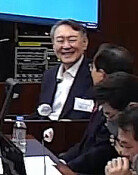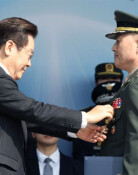Although the President is Frank...
Although the President is Frank...
Posted June. 16, 2005 03:04,
"[We] are agonizing over whether to hold the Korea-Japan summit and how to set the agenda."
Above is what President Roh Moo-hyun, who is the "highest-profile diplomat" of the government, said at the lunch meeting with the chairpersons of five parties and the heads of the executive, legislative, and judiciary branches at Cheong Wa Dae on June 14. The remark is stirring up a subtle disturbance.
Negotiation Strategy Albeit a "Breach of Diplomatic Etiquette?"-
The aforementioned remark, which was stated a few hours before the announcement of the Korea-Japan summit, is a breach of diplomatic etiquette. Yet President Roh implied that it was, for the most part, an intentional remark, saying, "Counterparts are important, and a strategic and flexible stance is also necessary in negotiations, but sometimes it is also important to push forward just like embanking a river to hold water."
Lee Keun, a professor of international relations at the graduate school of Seoul National University, commented, "If diplomacy is defined as maintaining bilateral relationships by following normal protocol, parts of President Roh`s remark can be problematic. Nonetheless, if he said it at a strategic level, I don`t think that it would be a great problem."
Yet there are quite a few diplomatic experts who are bewildered by the president`s remark of "to do or not to do" which was made officially and before the summit.
An authority of the Foreign Ministry retorted, "If [the president] has something to say, he should do it boldly at the summit. Suppose we are in the Japanese government`s shoe: how would we be feeling if the president of our counterpart said something like that before a summit?"
Straight Talk is Cool but Bitter Feelings are Problematic-
President Roh speaks too frankly. As a consequence, he was indicted several times for what he had said. Yet considering that diplomacy is not about personal but rather international relationships, it is again different.
At a lecture he gave at the Sorbonne University in France in December 2004, President Roh said, "The reason we feel more attracted towards France is because the French culture is different from that of the United States." By saying that "I wonder if there are American friends who would feel disappointed if I make a slip of the tongue" at the outset of his speech, he took a "decisive" decision to breach the diplomatic etiquette of comparing countries.
President Roh`s remark was immediately conveyed to U.S. authorities. U.S. officials who met a Dong-A Ilbo journalist in the beginning of this year expressed their discontent quoting President Roh`s remark in France.
President Roh`s "Letter for the People," which he wrote in March when tensions were escalating between Korea and Japan due to the Dokdo dominion issue, became controversial because he exposed his emotions. Targeting Japan, President Roh wrote, "There could be a tough war of diplomacy. I will, without failure, uproot [Japan`s misdeeds]."
At the conclusion of his letter, President Roh made a revision: he changed "we will prevail" to "our demand will surely be responded by history."
President Should Secure a Withdrawal Root-
The danger of using straight language in diplomacy is that one intercepts his own "withdrawal root." In particular, when the prospect is unclear, one can be swept in the controversy of changing his words if he employs conclusive language.
At the graduation ceremony of the Air Force Academy on March 8, President Roh said, "Our military`s objective is not only to protect the peace and prosperity of the Korean Peninsula but also Northeast Asia. We will firmly secure regional peace as a power balancer of Northeast Asia."
The remark, which was named the "Northeast Asian Balancer," caused its neighbors to make quite a few misunderstandings.
As a repercussion, Cheong Wa Dae explained the background on May 31, "The talk of the Northeast Asian balancer was prepared when Japan was at the height of advancing the discussion on the legalization of re-armament and reinforcement." With the Korea-Japan summit ahead, the Foreign Ministry also hurriedly explained that the "`ultimate balancer` in Northeast Asia is the United States.
Young-Chan Yoon Jung-Eun Lee yyc11@donga.comlightee@donga.com




![두쫀쿠가 뭐라고…영하 8도에 아이들 1시간 줄세운 어린이집 [e글e글]](https://dimg.donga.com/c/138/175/90/1/wps/NEWS/IMAGE/2026/01/09/133126969.3.jpg)
![지하철 타고 가는 북한산성…외국인도 반한 ‘K등산 맛집’[전승훈 기자의 아트로드]](https://dimg.donga.com/c/138/175/90/1/wps/NEWS/IMAGE/2026/01/10/133120824.1.jpg)

